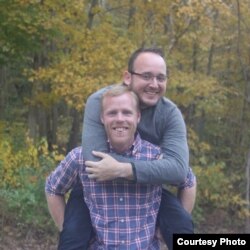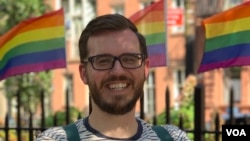“I grew up in Texas in the 1990s, and I don’t remember seeing any LGBTQUIA+ people,” Michael Terry told VOA, using an acronym for sexual minorities, including lesbian, gay, bisexual, transgender, queer, intersex, asexual and other people.
“Not in person, not on TV or movies, and not in the books I read,” said Terry, who is gay and lives in Atlanta, Georgia. “It made me feel like something was wrong with me and caused me to have thoughts of self-harm and suicide.”
June in the United States marks LGBTQ Pride Month, a celebration of sexual minority communities, including lesbian, gay, bisexual and transgender people. This year's Pride Month coincides with concerted and accelerating state-led efforts to restrict certain activities by Americans who identify as transgender and to cordon off drag queens from broader society.
“We’ve spent decades trying to build representation in society,” Terry said, “and now it’s being systematically dismantled by legislation being pushed in Republican-controlled states across the country.”
The American Civil Liberties Union reports 491 bills introduced in U.S. states this legislative session that the organization believes attack LGBTQ+ rights. Sixty-two of those bills have already been passed into law, by the ACLU’s count.
Florida Governor Ron DeSantis, a presidential contender, signed into law restrictions on gender-affirming treatments for minors seeking to transition to a new gender, as well as restrictions on drag shows, bathroom usage and pronoun usage in schools.
In Kansas, new laws are leaving many transgender people unable to use bathrooms of the gender with which they identify, or to change how they identify on their driver's licenses. Public school teachers in Florida and Iowa are restricted from discussing gender identity and sexual orientation issues with students. In many states, local school boards have removed LGBTQ-themed books from libraries.
“This month — Pride Month — is supposed to be a time of hope, relief and joy,” Janet Genusa of McComb, Mississippi, who identifies as lesbian, told VOA. “But those feelings have largely been replaced by fear and anxiety.”
Competing feelings
“I don’t think these laws are meant to stop people from being gay,” said Danielle Streger, a Republican voter from Tampa, Florida. “I just think LGBT pride is everywhere now — rainbow-colored beer bottles, rainbow-colored toilet paper — and my elementary school-aged children are surrounded by it in class.”
She continued, “If an adult wants to change their gender, that’s up to them, and I don’t want to stop them. But we should be able to discuss these complicated things as a family when I, the parent, feel my girls are ready. I don’t want them to be force-fed it at school. It’s not the teacher’s responsibility.”
Many of the new laws being proposed across the country are focused on people who identify as transgender or nonbinary - that is, their gender is different from the sex they were assigned at birth - accounting for 1.6% of the U.S. population, according to a 2022 Pew Research Center survey.
While the U.S. State Department and Social Security Administration announced last year that Americans are now allowed to select “X” rather than “male” or “female” for their sex marker on their passports and Social Security applications, Americans are largely divided on how they feel the law should treat transgender people.
A Washington Post-KFF poll released in March, for example, found 57% of American adults believe that gender should be based on sex assigned at birth. An overwhelming majority of Americans, however, support laws that prohibit discrimination against transgender people on a variety of policy issues.
Seventy-four percent, for example, support housing laws prohibiting such discrimination. And while most survey respondents are in favor of gender-affirming counseling for youth and teens, the majority oppose providing medication such as hormone therapy to minors.
“When gay marriage was legalized by the Supreme Court back in 2015, there was so much optimism that the country was on our side and that progress would continue,” said Jeremy Fogg, a baker in New Orleans. “But now, it feels like conservatives are saying, ‘Well, we lost that fight, so now let’s target this more vulnerable group.’
“Transgender people are already fighting so hard just to be themselves — through coming out, hormone therapy and gender-affirming care — that this is only making their struggle even harder,” Fogg told VOA. “So much of the optimism from 2015 is gone, but it also feels like if we fight hard enough, maybe these setbacks can just be a blip in the larger social progress of history.”
Setback or blip?
University of Georgia political scientist Charles Bullock said history can be a potential guide on how to view progress for rights in the LGBTQ+ movement. He warned, however, against viewing the current laws focused on the trans community as a setback to other gains made in the past.
“It’s highly unusual to eliminate a right once it’s conferred,” he told VOA, “and that’s not what we’re seeing here. There is no challenge on the same-sex marriage front or to discriminating against gay or transgender people in the workforce. The transgender issues are new and apparently viewed differently by a share of the public.”
Bullock said he thought that some of the restrictions focused on children have precedents.
“For non-adults, there are limitations keyed to age,” he explained. “Driving a car, drinking, voting, purchasing firearms and even protections against how children can be punished if they commit a crime. This provides a basis for arguing that a young person should not be allowed to make permanent decisions with regard to gender until reaching a certain age.
“In the end, will the LGBTQ community get every right they would like? Probably not,” Bullock said. “But I do expect they’ll gain some additional rights similar to how it seems to have occurred in our federal system in the past — first with a few pioneering cities and states, and then expanding to the national level.”
That expansion of rights, many in the LGBTQ+ community believe, will require a fight they are prepared to wage.
“I think our love is louder than this meddling by these bad actors,” said Diego Sanchez, director of advocacy, policy and partnerships for PFLAG National, an organization dedicated to supporting, educating and advocating for LGBTQ people and their families.
“Businesses and lawmakers and good people who believe in justice and inclusion have risen with us,” Sanchez told VOA. “Together, we will continue to meet this moment and to fight to ensure every LGBTQ+ person is safe, celebrated, empowered and loved.”
Mel Manuel of Madisonville, Louisiana, who identifies as pansexual nonbinary, is running for a seat in the state's legislature. Manuel wants legislatures and Americans to work together to solve bigger issues, rather than restricting the LGBTQ community.
“I wish Republicans understood that the LGBTQ community is not the enemy,” Manuel said. “I think their political leaders are using us as a distraction. Wages that have stagnated for decades. So many of us living paycheck to paycheck. Americans going bankrupt due to medical expenses. Why not work on these issues instead of paying so much attention to which bathroom trans people are using?”







